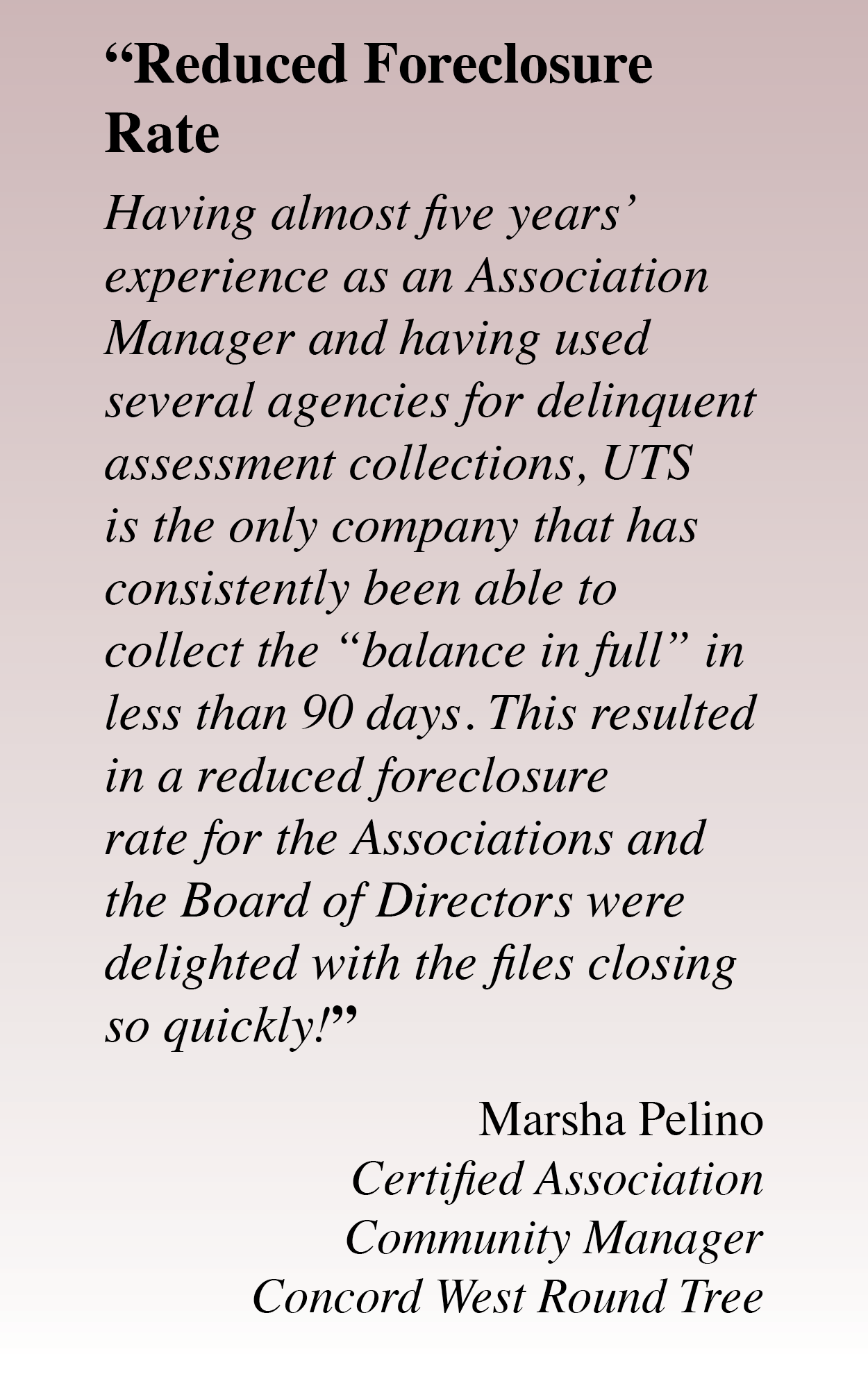QUESTIONS AND ANSWERS
The Non-Judicial Collection Process for delinquent homeowners can be very complex. Below are some frequently asked questions that Homeowner Associations (Association) and Property Management companies have asked during the process.
The Process:
Q: Does UTS have an online reporting system?
A: Yes. UTS online member portal – “Einstein”, enabled status reporting 24/7, for you and your Board members, the most up to the minute account status. Additionally, these status reports can be requested, scheduled and delivered to your e-mail.
Q: Can UTS attend Board meetings with the Board and Property Manager to discuss the Association’s delinquent accounts?
A: Yes. UTS can attend Board meetings, at no cost, to Educate the Board on the Non-Judicial Foreclosure process and specific accounts if needed.
Q: Does UTS accept partial payments and/or offer payment plans?
A: Yes. All partial payments made by the owner shall be applied to the oldest assessment first. (Civil Code §5655.) UTS offers a variety of payment plan options to help our homeowners. Our goal is to return the assessment revenue stream back to the Association as soon as possible. We are flexible and reasonable with our fees to insure a settlement with the delinquent homeowner as quickly and efficiently as possible.
Q. What happens if a Homeowner defaults on a payment plan?
A: It depends on how the Board of Directors would like to proceed. UTS will call the homeowner to remind them they have missed a payment and typically, the homeowner resumes their payment plan. If not, UTS without further notice
Q: What services does UTS offer prospective clients?
A: UTS Specialize in a Full Range of HOA Collection Services, Liens through Non-Judicial Foreclosure, Small Claims and Civil Unlimited Court actions and facilitating all aspects of the collection process with one company.
Q: Who decides to record a lien for delinquent assessments?
A: For liens recorded after January 1, 2006, the decision to record a lien for delinquent assessments shall be made only by the Board of Directors of the Association and may not be delegated to an agent of the Association. Civil Code Section 5670, 5673, 5665.
Q: Who can sign the Authorization to Record a Lien?
A: The Authorization to Record (ATR) a Lien must be signed by a Board Member in an Open-Meeting and approved by a majority vote. The ATR cannot be signed by an agent of the Board.
Q: How do we get started with UTS?
A. Forward UTS the Association document setup as seen (below) and email to: ClientServices@UnitedTrusteeServices.com
- CC&Rs – (which includes recording information).
- Articles of Incorporation.
- Bylaws
- Budget
- Delinquency Assessment Collection Policy.
- Signed Delinquency Assessment Collection Agreement.
Q: How do we submit a delinquent homeowner?
A: New files can be submitted with a UTS File Submission Form and current account ledger and emailed to: Submissions@UnitedTrusteeServices.com.
Q. Can the Board accept partial payments?
A: Yes. Partial payments can be accepted. However, we recommend contacting UTS for any payment that has been accepted.
Civic Code:
Q. When do assessments become delinquent?
A: Assessments become delinquent fifteen (15) days after they are due, unless the governing documents provide for a longer time. Civil Code Sections 5730, 5650.
Q. When can an Association place a lien on a property for a delinquent regular or special assessment?
A: After January 1, 2003, a lien may not be placed on a property until at least thirty (30) days after
Q. What must be included within the Pre-Lien Notice to the owner?
A: Requirements in the Pre-Lien Notice:
- A general description of the collection.
- Lien enforcement procedures of the Association.
- Method of calculating the amount.
- A statement that the owner may inspect the Association’s records.
- A conspicuous notice that the home may be sold in foreclosure without court action.
- An itemized statement of charges owed by the owner.
- A statement that the owner shall not be liable to pay the charges, etc. it is determined that the assessment was paid on time.
- The right to request a meeting with the Board.,
- The right to dispute the assessment debt by submitting a written request for dispute resolution pursuant to the Association’s meet and confer program.
- The right to request alternative dispute resolution with a neutral third party.
Civil Code Section 5650(a), 5660, 5660(a)-(f).
Q: What are the threshold requirements for seeking to collect delinquent or regular assessments through Judicial or Non-Judicial Foreclosure?
A: The amount of the assessment secured by a lien (exclusive of accelerated assessments, late charges, fees and costs of collection, attorney’s fees, or interest) equals or exceeds Eighteen Hundred Dollars ($1,800) or assessments secured by a lien that are more than twelve (12) months delinquent. Civil Code Section 5705(b)-(d), 5715.

